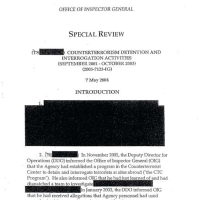Senate Report on CIA Torture Techniques May Remain Secret

Even though everyone in the world knows that the CIA tortured many suspects during the height of the 2003-2008 “War on Terror,” a comprehensive Senate report on the subject set for approval this week may be kept from the public. The 6,000 page report is said to conclude that “enhanced interrogation” techniques—including waterboarding, sleep deprivation, forced nudity and physical abuse—contributed little or no intelligence that could not have been obtained legally. Waterboarding used to be called “water torture,” and the U.S. hanged Japanese interrogators who used it on American POWs during World War II.
Senator Dianne Feinstein, (D-California), who chairs the Select Committee on Intelligence, called the report “comprehensive, … strictly factual, and … the most definitive review of this CIA program to be conducted,” but cautioned that “any decision on declassification and release of any portion of the report will be decided by committee members at a later time.” The committee analyzed millions of pages of records on a CIA program that included a network of secret prisons and the “extraordinary rendition” —i.e., non-legal extradition—of suspects, including those for whom there were no arrest warrants, to countries where the CIA knew they’d be tortured.
Republicans, who form a minority on the committee, have been boycotting the investigation since summer 2009, when the Justice Department began a separate investigation into the CIA interrogations. Although that investigation closed in August without bringing criminal charges, it is not known if Republicans will drop their protest of the Senate report or vote to reject it.
In any event, in the “through the looking-glass” world of national security, much about the CIA’s program remains officially secret, despite widespread reporting and acknowledgement of many of the facts by former President George W. Bush and others. This has led the Obama administration, which came into office promising a new era of government openness, to argue in court that details about the program—even including Guantánamo detainees’ own accounts of their imprisonment—are still classified and should be officially kept from the public.
It is also still unclear what key members of Congress knew about the program, and when they knew it. If the Senate Committee report sheds light on that issue, there may well be senators with a strong personal interest in keeping that information quiet as well, creating yet another reason the public may have to wait quite a while before getting the answers it deserves.
-Matt Bewig
To Learn More:
Senators to Vote on Probe of CIA Interrogation Program (by Mark Hosenball, Reuters)
The Senate Report on CIA Interrogations You May Never See (by Cora Currier, ProPublica)
Federal Judge Refuses to Punish CIA for Destroying Torture Videos (by Noel Brinkerhoff and David Wallechinsky, AllGov)
- Top Stories
- Unusual News
- Where is the Money Going?
- Controversies
- U.S. and the World
- Appointments and Resignations
- Latest News
- Trump Orders ICE and Border Patrol to Kill More Protestors
- Trump Renames National Football League National Trump League
- Trump to Stop Deportations If…
- Trump Denounces World Series
- What If China Invaded the United States?






Comments